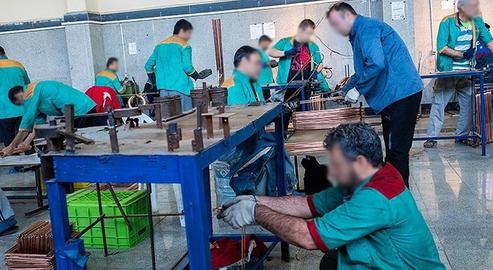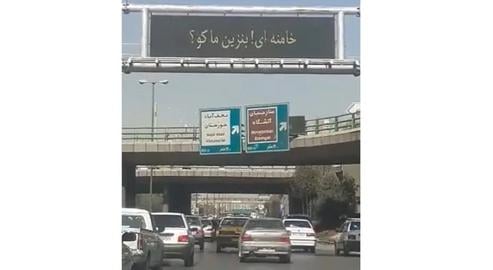Those unfortunate enough to have experience of Iranian prisons are unanimous on the poor quality and exorbitant prices of prison store goods, which they are effectively forced to buy from. Convicts are convinced that the canteen food is deliberately so badly cooked that they’re left with no choice but to spend more in the shops, creating a captive market.
This monopoly has benefited no-one other than the National Prisoners’ Cooperative Foundation, which owns all prison stores across the country. The Foundation is also responsible for running prison workshops and sweatshops, many of whose products are sold in high-end commercial stores on the outside (that it often also owns). What do we know about this decades-old conglomerate, and who benefits from the stitch-up?
***
When the average well-to-do Iranian drinks coffee in a coffee shop at Tehran’s Gholhak Shopping Center, sits down to lunch in the food court, or snaps up the latest creations from their favorite brands, they aren’t aware that a lot of what’s on offer in this stylish mall comes off the backs of underpaid prisoners in jails around Iran. Many shops, entertainment centers and venues on the outside aren’t just touched but owned outright by the National Prisoners’ Cooperative Foundation: a state-run but officially non-profit organization that also owns every prison store in the country.
The Foundation’s official website describes it as follows: "The 65-year-old Prisoners’ Cooperative Foundation was established with the aim of empowering prisoners to return to society. This institution, which does not receive government funding, owns more than 2,200 manufacturing, industrial, agricultural, livestock and service units inside, around, and outside prisons, and runs them autonomously. Prisoners now produce 3,000 types of goods and products in 14 production groups, and this trend continues to grow."
On June 18, 2019, the Foundation held an extraordinary general assembly in the presence of then-Chief Justice Ebrahim Raisi. During this meeting, key amendments to two of its articles of association were approved. Article 2 now states: "The Prisoners' Cooperative Foundation is a legally independent entity and a non-governmental, non-profit foundation governed by the laws and regulations of the Islamic Republic of Iran." Article 12 was amended to say: "The board of directors consists of five people appointed on the suggestion of the head of the Prisons Organization, and the approval of the chairman."
These changes allowed the Prisons Organization to make a highly suspect follow-up announcement in its updated executive regulations, approved on May 18, 2021. "The Prisoners' Cooperative Foundation is a non-profit organization with an independent legal personality."
In an earlier report dated July 14, 2018, Mehr News Agency claimed that at that time the Prisoners’ Cooperative Foundation was actively running 800 small and large-scale production units around the country. Former CEO and current board member Rahim Motaharnejad told reporters that convicts working in prison workshops were paid at least half of the national minimum wage.
“Every year the Supreme Labor Council sets the rates of pay, and we make new decisions regarding the salaries of prisoners,” he said. “This happened in April 2020: all our provincial departments were informed that the salaries and benefits of working prisoners would be increased based on the tasks they perform... It’s a part of the resolution every year. For example, if this year the minimum wage of workers is 1.8 million tomans, we’ll approve and pay a percentage of that. Currently, 50 to 60 percent of the figure approved by the Supreme Labor Council is considered [for prisoners]."
The former CEO’s assertion is not true according to the testimonies of several former prisoners. In a previous report, IranWire heard from Iranian convicts who said they were being paid 600,000 tomans (US$144) for 176 hours of work sewing garments a month, while outside the minimum wage was 1.5m tomans. In other words, they received less than 40 percent of the going rate for their labor behind bars.
The Board of Directors
The Prisoners' Cooperative Foundation's website says it produces and sells more than 1,100 different products manufactured in prisons across the country. Among them are fashion garments, work clothes, carpets, carpentry, mosaics, food and dried fruit packaging, dolls, handicrafts such as jewelry, bicycles, leather and sports bags and shoes, suitcases, car seat covers, sanitary masks and surgical gowns. Prisoners also work in other fields such as animal husbandry, agriculture, horticulture and fish farming.
The Foundation’s larger-scale activities are split across a number of subsidiaries, including the former Ajand Armeh Company of Karaj, now the Hami Omid Civil and Construction Company, which works in housing and construction, the Fadak Fashafouyeh Agro-Industrial Company, which owns hundreds of hectares of orchards, most notably pistachio farms, the Pasargad Kish Oil and Refining Company, which is active in the development of oil fields, drilling and exploration, and the Sarzamin-e Gol Hami Agro-industrial Company, which grows and sells flowers.
The five-strong, Prisons Organization-approved board of directors includes Khosrow Mokhtari, Rahim Motaharnejad, Solat Mortazavi, Mohammad Aram Benyar and Reza Zanganehnejad. Mokhtari has been managing director since January 2021. Before taking on the role at the Prisoners' Cooperative Foundation, he was the director of Omid Construction Company: a subset of the Executive Headquarters of Imam's Directive (Setad), a massive holdings company under the control of the Supreme Leader. He also sits on the boards of several other state-owned entities, as well as the Hamian Omid Farda Trading Company: itself a subsidiary of the Prisoners' Cooperative Foundation. This particular firm specializes in IT services.
Solat Mortazavi, meanwhile, is chairman of the board. He’s currently better known in Iran for being Ebrahim Raisi’s vice president for executive affairs, and head of the Office of the President. A former governor of South Khorasan, Mortazavi has held down a range of roles in the Prisons Organization and Ministry of Interior in the past. He also sits of the board of one of the Foundation’s subsidiaries: the Hami Edalat Electronic Services Development Company.
Board member Mohammad Aram Benyar has also previously served as a director of Bank Mellat. His name was mentioned many times in court during the bank’s infamous corruption scandal. He himself was even forced to answer questions from the judge and prosecutor, but in the end was never formally charged. Benyar was formerly the managing director of the Daris Arman Kish Investment Company: one of the handful of trust companies that Bank Mellat had used to circumvent sanctions.
Outside of the current board of directors, other notable figures have previously been at the helm of in the Prisoners’ Cooperative Foundation. Ex-IRGC commander Akbar Ghamkar, who is also the CEO of Persepolis Football Club, was formerly the chairman and a key decision-maker on the activities of the Foundation’s subsidiaries. Having previously had a role in large-scale military economic institutions such as the IRGC’s own Cooperative Foundation and the Foundation for the Oppressed, he led the Prisoners' Cooperative Foundation to become a vast holdings company, without his name being ever mentioned in public.
Hami Economic Holdings: Wealth Off the Backs of Prisoners
Hami Economic Holdings is the most important and largest subsidiary of the Prisoners' Cooperative Foundation. Many of the low-quality, extortionately-priced products that inmates are forced to buy in prison stores are themselves produced by Hami, including canned fish, rice, poultry, and toiletries. But Hami's activities don’t end there: there are currently 50 chain stores under the Hami scattered throughout Iran. Most shoppers have no idea how this company is profiting from prisoner labor.
The first branch of Hami’s public-facing chain opened its doors in Tehran in 2009. On May 22, 2020, Mizan News Agency announced that the Prisoners' Cooperative Foundation had built, equipped and begun operating 45 Hami stores in provincial and urban centers over the past eight years, and aimed to have opened 70 by the end of the year. Hami has branches all over the country, from in Khuzestan and Kurdistan to Zanjan, Qazvin, Isfahan and Tehran.
The flagship store located in the Shahr-e Ziba area of the Iranian capital, as it happens next to the local Correction and Training Center. Adjoining the store is a cafe bearing the same name, so customers don’t have to travel far to refresh themselves. "We offer customers about 4,000 items, more than half of which are produced by inmates inside the prisons," an employee at the Hami store told IranWire.
He added: "Our salary is the minimum set by the Ministry of Labor, which is about 3.5 million tomans including overtime and bonuses. Sometimes I feel like that if they’re paying me this amount, when I was compelled to come to this job, I can only imagine how little they must be paying for the forced labor in prisons."
Gholhak Shopping Center and Food Court
The Foundation’s commercial premises don’t stop at individual stores. It also owns leisure and entertainment centers, car washes, restaurants, guest houses and shopping malls across the country. The Gholhak Shopping Center in Shariati Street, Tehran, is one of them. This modern, luxury shopping destination was built in 2007, featuring 70 modern commercial units spread over eight floors on a 2,000 square meter parcel of land. Inside, you can buy all kinds of men’s, women’s and children’s clothing, gold and cosmetics. Most of the companies affiliated with the Prisoners 'Cooperative Foundation also have their headquarters inside the building.
"Almost all of the units are still owned by the Prisoners' Cooperative Foundation,” the manager of one of the restaurants in the food court told IranWire. “We are all tenants. The rent is calculated based on the local average, which is naturally very high. Most of our customers don’t know that we have anything to do with prisons or the Prisoners' Foundation, and of course, I doubt it would make a difference to them if they did.
"We also don’t know where the exorbitant rent we pay is spent, or whether or not this shopping center was built on oppressing prisoners. People are so preoccupied with their own problems these days, they don’t think about it. A shopkeeper can easily be evicted here if they default on rent for two months, because [the venue] is backed by the prisons and the judiciary."
The annual income and expenditure of the National Prisoners' Cooperative Foundation have never been made public knowledge. The extent of its connections to Iran’s oil, energy and construction sectors are also an unknown quantity. What is obvious, though, is that any wealth it accumulates is the direct result of the daily suffering of prisoners in Iranian jails. Inmates are being forced to buy the Foundation’s own low-grade products even as they provide the luxury goods and services that are the source of its wealth.
Related coverage:
Hungry Convicts Extorted by Iranian Prison Shops
IranWire Exclusive: Sex Workers in Tehran Jails
Rich and Well-Connected Prisoners Enjoy Extended Furloughs in Their Luxury Villas
Ex-Guards Fixer Jailed for Corruption Living Large in Prison
Fact Check: Does the Islamic Republic Really Fight Corruption?
From Luxury Villas to Defrauded Banks: The Mother of All Corruption Cases Gets Under Way in Iran
Financial Criminals and Prison Guards Set Up Factories Behind Bars
visit the accountability section
In this section of Iran Wire, you can contact the officials and launch your campaign for various problems



























comments